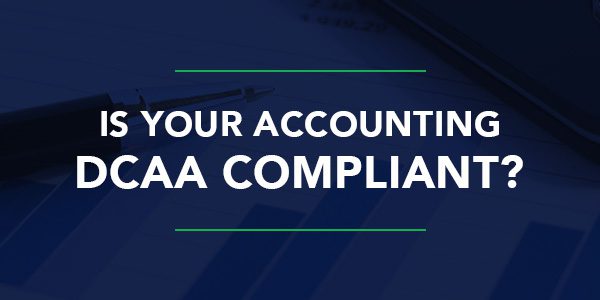A GovCon Checklist for Changing Accounting Systems
So you’ve decided to upgrade or even completely change your government contract accounting system. First of all, congratulations. Secondly, there are some things you’re going to need to do as a government contractor to make sure you’re maintaining DCAA compliance with your new accounting system.
You already know this, but accounting for GovCons isn’t the same thing as accounting for commercial companies. Sure, it’s still accounting. It’s record-keeping and tracking expenses and revenue and all of that. But it’s one of the most important areas of your business in terms of making sure you’re compliant, and making sure you’re covered under DCAA accounting compliance is one of the best steps you can take toward a secure financial future. When things go wrong with the money, they can go very wrong indeed.
So we thought we’d put together a little list of vital steps that you need to take when you or any government contractor changes your accounting system.
The DFARS Accounting Software Criteria
To be able to pass a DCAA audit, your accounting software will have to meet the adequacy criteria of the Defense Federal Acquisition Regulation Supplement (DFARS) Business Systems Rules.
There are 18 criteria that can be broken down into 5 major capabilities when determining whether your new government contractor accounting software system meets the requirements:
- An internal control environment that oversees approval, structure, access, monitoring, and policies
- Separation of direct and indirect costs on a month-to-month basis for project allocation
- Cost reporting under general ledger control, subsidiary cost ledger, and transactional details
- Timekeeping and distribution of direct and indirect labor costs
- Compliance with contract terms, conditions, regulations, and other laws
Transfer Your Archival Accounting Data
Moving to a new DCAA-compliant accounting system doesn’t mean you can just get rid of all your old accounting data. That will probably (definitely) lead to your company failing a DCAA compliance audit and cost you a pretty penny.
Instead, you’ll need to take the time to archive all of your old accounting data. To be precise, you’ll need to ensure all data is accessible at a later time and ensure that that data remains on the system of record. Depending on how big your company is, this could be a pretty daunting task but it’s vital that you do it right.
Record Retention Requirements for Government Contractors
As a government contractor, your company is required by Federal Acquisition Regulations (FAR) to make your records and other supporting material available to satisfy contract negotiation, administration, and audit requirements for a certain number of years (usually around 3) after final repayment. See FAR sections 4.703–4.705 to confirm the numbers of years that each kind of record must be retained.
There are a few different types of records that you’ll need to keep track of:
- Billing Records – These include your company’s invoices, as well as any correspondence with the customer about the billing process.
- Contract Records – All correspondence between your company and the prime contractor or contracting officer should be kept, as well as the final executed copy of the contract.
- Time and Attendance Records – You’ll need to keep track of employee time cards, as well as any leave requests or vacation days.
- Employee Compensation Records – This includes W-forms, I-forms, and any other tax forms that you’re required to withhold from your employee’s paychecks.
This is by no means an exhaustive list, but it’s a good place to start.
Consider Bringing In Help for Your Accounting System Change
There are a lot of things to consider when changing accounting systems as a government contractor, and failure in any of these areas could be costly down the road in the case of an audit.
The good news is that you don’t have to do it all by yourself.
At BOOST, we help government contractors by providing an array of GovCon back-office services. If your company is looking for help changing to a new government contractor accounting system while staying compliant, we’re the right team for the job. Contact us today and let’s talk about how we can assist.








